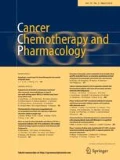Abstract
Purpose
Irinotecan can cause high levels of diarrhea caused by toxic injury to the gastrointestinal microenvironment. Toll-like receptor 4 (TLR4) and the gut microbiome have previously been implicated in gastrointestinal toxicity and diarrhea; however, the link between these two factors has not been definitively determined. We used a tumor-bearing, intestinal epithelial cell (IEC) TLR4 knockout model (Tlr4ΔIEC) to assess microbiome changes following irinotecan treatment. We then determined if a fecal microbiota transplant (FMT) between Tlr4ΔIEC and wild-type (WT) mice altered irinotecan-induced gastrointestinal toxicity.
Methods
MC-38 colorectal cancer cells were injected into WT and Tlr4ΔIEC mice. Fecal samples were collected prior to tumor inoculation, prior to irinotecan treatment and at cull. 16S rRNA gene sequencing was used to assess changes in the microbiome. Next, FMT was used to transfer the microbiome phenotype between Tlr4ΔIEC and WT mice prior to irinotecan treatment. Gastrointestinal toxicity symptoms were assessed.
Results
In study 1, there were no compositional differences in the microbiome between Tlr4ΔIEC and WT mice at baseline. However, predicted functional capacity of the microbiome was different between WT and Tlr4ΔIEC at baseline and post-irinotecan. In study 2, Tlr4ΔIEC mice were protected from grade 3 diarrhea. Additionally, WT mice who did not receive FMT had more colonic damage in the colon compared to controls (P = 0.013). This was not seen in Tlr4ΔIEC mice or WT mice who received FMT (P > 0.05).
Conclusion
Tlr4ΔIEC and WT had no baseline compositional microbiome differences, but functional differences at baseline and following irinotecan. FMT altered some aspects of irinotecan-induced gastrointestinal toxicity.


Data availability
Available upon reasonable request.
Code availability
Not applicable.
References
Ribeiro RA et al (2016) Irinotecan- and 5-fluorouracil-induced intestinal mucositis: insights into pathogenesis and therapeutic perspectives. Cancer Chemother Pharmacol 78(5):881–893
Wardill HR et al (2016) Irinotecan-induced gastrointestinal dysfunction and pain are mediated by common TLR4-dependent mechanisms. Mol Cancer Ther 15(6):1376–1386
Wong DVT et al (2021) TLR4 deficiency upregulates TLR9 expression and enhances irinotecan-related intestinal mucositis and late-onset diarrhoea. Br J Pharmacol 178(20):4193–4209. https://doi.org/10.1111/bph.15609
Alexander JL et al (2017) Gut microbiota modulation of chemotherapy efficacy and toxicity. Nat Rev Gastroenterol Hepatol 14(6):356–365
Crame EE et al (2021) Epithelial-specific TLR4 knockout challenges current evidence of TLR4 homeostatic control of gut permeability. Inflamm Intest Dis 6:199–209
Wardill HR et al (2019) Adjunctive fecal microbiota transplantation in supportive oncology: emerging indications and considerations in immunocompromised patients. EBioMedicine 44:730–740
Chang CW et al (2020) Fecal microbiota transplantation prevents intestinal injury, upregulation of toll-like receptors, and 5-fluorouracil/oxaliplatin-induced toxicity in colorectal Cancer. Internat J Mole Sci 21(2):386
Cui M et al (2017) Faecal microbiota transplantation protects against radiation-induced toxicity. EMBO Mol Med 9(4):448–461
Grasselly C et al (2018) The antitumor activity of combinations of cytotoxic chemotherapy and immune checkpoint inhibitors is model-dependent. Front Immunol 9:2100
McNally CP et al (2018) BURRITO: an interactive multi-omic tool for visualizing taxa-function relationships in microbiome data. Front Microbiol 9:365
Secombe KR et al (2021) Guidelines for reporting on animal fecal transplantation (GRAFT) studies: recommendations from a systematic review of murine transplantation protocols. Gut Microbes 13(1):1979878
Langford DJ et al (2010) Coding of facial expressions of pain in the laboratory mouse. Nat Methods 7(6):447–449
Parks DH et al (2014) STAMP: statistical analysis of taxonomic and functional profiles. Bioinformatics 30(21):3123–3124
Loman BR et al (2019) Chemotherapy-induced neuroinflammation is associated with disrupted colonic and bacterial homeostasis in female mice. Sci Rep 9(1):16490
Dheer R et al (2016) Intestinal epithelial toll-like receptor 4 signaling affects epithelial function and colonic microbiota and promotes a risk for transmissible colitis. Infect Immun 84(3):798–810
Long S et al (2020) Metaproteomics characterizes human gut microbiome function in colorectal cancer. NPJ Biofilms Microbiomes 6(1):14
Nusbaum DJ et al (2018) Gut microbial and metabolomic profiles after fecal microbiota transplantation in pediatric ulcerative colitis patients. FEMS Microbiol Ecol 94(9):133
Pamer EG (2014) Fecal microbiota transplantation: effectiveness, complexities, and lingering concerns. Mucosal Immunol 7(2):210–214
Burrello C et al (2018) Therapeutic faecal microbiota transplantation controls intestinal inflammation through IL10 secretion by immune cells. Nat Commun 9(5184):1–8
Taur Y et al (2018) Reconstitution of the gut microbiota of antibiotic-treated patients by autologous fecal microbiota transplant. Sci Transl Med 10(460):eaap9489
Wardill HR et al (2021) Antibiotic-induced disruption of the microbiome exacerbates chemotherapy-induced diarrhoea and can be mitigated with autologous faecal microbiota transplantation. Eur J Cancer 153:27–39
Freitag TL et al (2019) Minor effect of antibiotic pre-treatment on the engraftment of donor microbiota in fecal transplantation in mice. Front Microbiol 10(2685):2685
Acknowledgements
KRS, EEC, and JSYT were in receipt of an Australian Government Research Training Program Scholarship. KRS was in receipt of a Lion’s Medical Research Foundation Scholarship. Thank you to Courtney Subramaniam, Ghanyah Al-Qadami, Georgette Radford and Claire Vieyra for assistance with the mouse studies. Thank you to the University of Adelaide Laboratory Animal Services staff for their assistance with the Tlr4ΔIEC model development and breeding.
Funding
Not applicable.
Author information
Authors and Affiliations
Corresponding author
Ethics declarations
Conflict of interest
The authors declare that they have no conflict of interest.
Ethics approval
These studies were approved by the Animal Ethics Committee of the University of Adelaide (M-2017-114, M-2020-028, M-2020-026), and complied with the National Health and Medical Research Council (Australia) Code of Practice for Animal Care in Research and Training (2013).
Additional information
Publisher's Note
Springer Nature remains neutral with regard to jurisdictional claims in published maps and institutional affiliations.
Supplementary Information
Below is the link to the electronic supplementary material.
Rights and permissions
About this article
Cite this article
Secombe, K.R., Crame, E.E., Tam, J.S.Y. et al. Intestinal toll-like receptor 4 knockout alters the functional capacity of the gut microbiome following irinotecan treatment. Cancer Chemother Pharmacol 89, 275–281 (2022). https://doi.org/10.1007/s00280-021-04382-3
Received:
Accepted:
Published:
Issue Date:
DOI: https://doi.org/10.1007/s00280-021-04382-3

